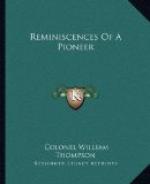Chapter XII.
The Peace Commission’s Work.
A. B. Meacham was at that time in Washington. He had been superseded as Superintendent of Indian Affairs by T. B. Odeneal. Meacham wanted the place, and backed by the churches and humanitarians of New England, thought he could accomplish his purpose by means of a compromise with Jack and his band. He declared to President Grant that he knew Jack to be an honorable man and that he could easily effect a compromise and induce the outlaws to return to the reservation. Meantime a clamor went up all over the country, especially in the east. Sentimentalists shed barrels of tears over the wrongs of the Indians, the horrors of the Ben Wright massacre were recapitulated with all manner of untruthful variations, and the great Beecher from the pulpit of his Brooklyn tabernacle sent up a prayer for “that poor, persecuted people whose long pent up wrongs had driven them to acts of outrage and diabolical murder.” Delegations, at the instigation of Meacham, visited the White House and finally succeeded in bending the iron will of the grim old soldier to their own. The hands that slew the Bodys and Brothertons were to be clasped in a spirit of brotherly love, and the principles and precepts of the “Lowly Nazarene” were to be extended to these gentle butchers.
Accordingly in February a commission was appointed consisting of A. B. Meacham, Jesse Applegate, and S. Case. The commission arrived at headquarters towards the last of February. They were instructed by the Commissioner of Indian Affairs “to ascertain the causes which led to hostilities between the Modocs and the U. S. troops;” to offer them a reservation somewhere on the coast with immunity for past crimes. In vain Gov. Grover of Oregon protested against any compromise with the murderers of Oregon citizens. He held that they were amenable to the laws of that State, had been indicted by a grand jury, and should be tried and executed as the law directs, but his protest was passed unheeded and the commissioners proceeded to carry out their instructions. Bob Whittle and his Indian wife were sent to convey the terms to Capt. Jack and his band, but Jack refused to have anything to do with the commissioners, although willing to talk to Judges Roseborough and Steele of Yreka. These gentlemen proceeded to the camp in the lava beds and held a conference and found that Jack was anxious for peace; was tired of war; did not know the commissioners; but wanted to talk to the chief soldiers, Generals Canby and Gillem. The former had arrived and assumed command of the one thousand or more troops assembled, while the latter had superseded Gen. Wheaton. John Fairchilds also had an interview with them in the lava beds and was only saved from massacre by one of the Indians, who kept him in his cave all night and escorted him beyond the lines the next morning. After some weeks of delay Jack finally agreed to a conference




